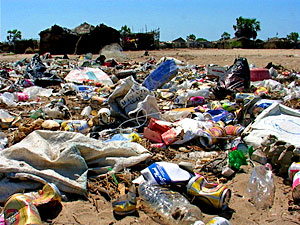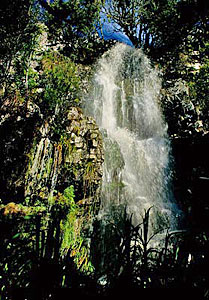| |
|
 |
|
Getting inspired and wiser |
The power of image is unquestionable. Many of us have seen environmental documentaries that paint a daunting picture of our planet, leaving us with little hope for our children’s future. Yet some films go beyond that, by engaging us, giving us hope and inspiration, and mobilising us to act. Some of the Earthnotes films have certainly made people talk and share ideas. In an effort to share the positive side of these discussions more widely, we have gathered some of the thoughts that came up and some tips for action.
 What to do with your waste What to do with your waste
The documentary about the Brazilian city of Curitiba, “A Convenient Truth”, was certainly one of the most inspiring films in the festival, and has triggered discussions about town planning and some of the most pressing challenges in overpopulated cities—recycling is one of them. While South Africa is still lagging behind, there are ways to reduce the amount of our waste that ends up in landfills. As was pointed out in George, very often the municipalities may have solid waste management plans in place, but the communities are not aware of them.
While the first step is to Reduce (for example, by choosing products with less packaging), we can also make a difference by reusing waste materials or sending them for recycling when possible. But how and where? Here are some other tips to Reuse and Recycle in the Western Cape area. If you have more tips for other areas, please write to the DLIST Team at admin@dlist-benguela.org.
- The City of Cape Town has put together a list of community waste drop-off facilities for your recyclable or reusable waste (download the list here). See also http://www.capetown.gov.za/enviro/erd/directory/recycle.html.
- In five large pilot projects throughout the metro area (the Think Twice initiative of the City of Cape Town), residents can now put out two different waste containers: their usual “wheelie” bin and a clear plastic bag for dry, recyclable waste.
- To find out about recycling programmes operating in your area, contact The Fairest Cape at 021 462 2060 or visit www.fairestcape.co.za.
- Schools can use many waste items for art projects (e.g. cardboard toilet roll cores, boxes, jars, margarine tubs and scrap paper).
- The Footprints Environmental Centre in Wynberg, with a drop-off centre for a variety of materials, is open for school visits and learning programmes. For more information contact Michelle Sholto-Douglas at gsdouglas@worldonline.co.za or 021 794 5586.
- Oasis, with branches in Claremont and Elsies River, provide a free collection service for businesses, and has a depot in Claremont for domestic drop-offs. Find out more at http://www.oasisrecycling.co.za. Abundance Recycling and Kool Waste Management collect waste from homes and deliver it to the Oasis Recycling Depot.
- Aimed at South African businesses, the Integrated Waste Exchange (IWE) works by matching "waste material generators" with "waste material users". Companies that produce certain waste items are matched with those that can use such items. Find out more through Wastewise at www.wastewise.org.za, wastewise.user@capetown.gov.za or 021 400 1111.
 Use water wisely Use water wisely
The documentary entitled “A World Without Water” raised issues surrounding water scarcity in the world. Many people in Namibia and South Africa can relate to this problem. Residents in the Namibian town of Henties Bay, for example, are finding it difficult to pay the high costs of municipal water supplied by NAMWATER. During the Earthnotes festival, debate in Henties Bay ensued on how poor people can have access to water, and how residents can be empowered to lobby the municipality. During the Earthnotes festival in George, concerns were raised with the growing number of developments in the Southern Cape, especially golf courses, housing estates and polo fields that are going up with little attention being paid to the provision of water. The rivers in the region are critically affected, and fewer and fewer riverine wetland areas remain.
In a region where water is scarce, we all have the responsibility to conserve water. Here are some tips from the SA Department of Water and Forestry to use water wisely (http://www.dwaf.gov.za/Events/WaterWeek/2007/tips.asp).
In and around the house/business
- Repair dripping taps. Check for and fix leaks—if your meter is running when all the taps and toilets are off, then you may have a leak.
- Turn off taps while washing your face, brushing your teeth or shaving. Just taking a five-minute shower a day, instead of a bath, will use a third of the water, saving up to 400 litres a week.
- Use low-flow showerheads, dual-flush toilet mechanisms and water-efficient washing machines. Do not pour paint and chemicals down the drain.
- Reducing the toilet flush volume alone can save 20% of total water consumption. This can be done by putting a 2-litre cold drink bottle, filled with water and a little sand to add weight, into the cistern.
- Use a bucket rather than a hose to wash your car. If you must use a hose, use a sprayer that can be turned off in-between spraying the car. Using a garden hose could use as much as 30 litres of water per minute.
- Farmers must ensure that they keep toxic insecticides away from water sources and streams. People living in rural areas should take care not to use the river or river bank as a toilet.
In the garden
- Always water your plants during the early morning hours or in the evening, when temperatures are cooler. You can lose up to 90% of water to evaporation.
- Every time you boil an egg, save the cooled water for your houseplants. They’ll benefit from the nutrients released from the shell.
- Focus on indigenous and non-water-consumptive alien plants (but not invasive alien plants), and clear invasive alien plants on your property.
- Water gardens less frequently, but water well. Using a garden hose could use as much as 30 litres of water per minute
- Use “grey water” (used water from baths, washing machines and other safe sources, or roof water stored in tanks) to water your garden.
|
|
|